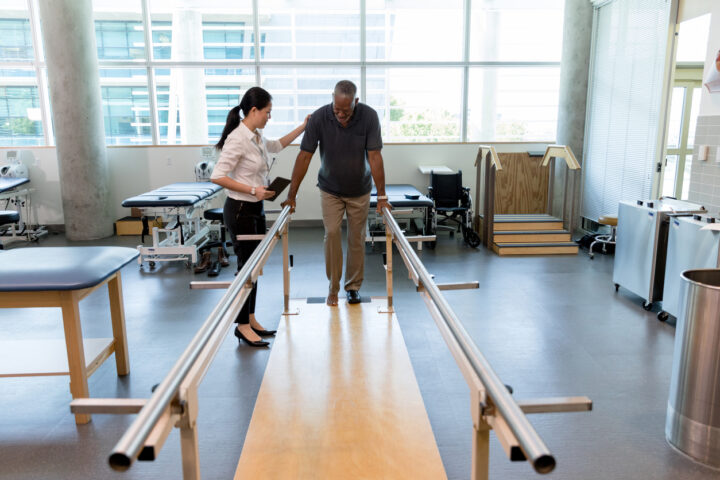Rehabilitation is a vital aspect of recovery for patients with physical injuries, illnesses, or mental health conditions. You can regain your physical, emotional, and mental health through medical treatment and therapy and improve your overall quality of life.
However, finding the right rehabilitation program can be challenging, especially where numerous options are available.
This article will explore therapy’s role in rehabilitation and provide information on where to find rehab in America.
Physical Rehabilitation

Physical therapy is an essential part of rehabilitation for people with injuries, illnesses, or surgeries.
It involves exercises, stretches, manual therapy, and equipment such as weights, resistance bands, and balance boards. The goal is to help you regain physical function, reduce pain and inflammation, and prevent further injuries.
Physical therapy is particularly beneficial for individuals recovering from orthopedic injuries, such as knee or hip replacements, and neurological conditions, such as stroke or spinal cord injuries.
Mental Rehabilitation
Mental health therapy helps you manage and overcome psychological and emotional challenges. It can address various conditions:
- Anxiety
- Depression
- PTSD
- Drug addiction.
Therapy aims at helping you improve your emotional and psychological well-being. It can involve developing coping skills, improving communication and problem-solving abilities, and enhancing self-esteem and self-awareness.
Therapy can also help you improve your relationships, strengthen your social support networks, and reduce the risk of relapse.
Benefits of Therapy

Therapy offers several benefits in the rehabilitation process. It helps you:
Improve Physical Function
Physical therapy helps you improve physical function by:
- Reducing pain
- Increasing strength and mobility, and
- Improving balance and coordination.
It can help patients recover from injuries or surgeries and strengthen their ability to perform daily activities such as walking, standing, and reaching.
Manage Mental Health Conditions
Mental health therapy can help manage conditions such as:
- Anxiety
- Depression
- PTSD
Therapy can give you the tools and skills to manage your symptoms and improve your emotional well-being.
Enhance Social Support
Therapy can help develop more robust social support networks, which are especially beneficial for those who may feel isolated or disconnected during recovery. Therapy provides you with a safe environment to express your feelings and connect with other patients who are going through similar experiences.
Achieve Personal Goals
Therapy can help you set and achieve personal goals related to your recovery, such as returning to work, resuming recreational activities, or improving your overall quality of life. By working with a therapist, you can develop a plan to achieve your goals and receive the support and encouragement you need to progress.
The Role of Therapists in Rehabilitation

The role of therapists in rehabilitation is critical in ensuring that patients receive appropriate care to help them regain their physical and mental health. Therapists use various techniques and therapies to help patients manage their pain, improve their mobility and independence, and promote their overall well-being.
Building Therapist-Patient Relationships
One of the primary responsibilities of therapists in rehabilitation is to build positive relationships with their patients. By establishing trust and rapport, therapists can encourage patients to be more open and honest about their physical and emotional needs, which in turn helps therapists design personalized treatment plans to address each patient’s unique needs.
Designing Personalized Treatment Plans
The development of personalized treatment plans is another essential role of therapists in rehabilitation. Therapists assess each patient’s condition and create a customized treatment plan that may include exercises, therapies, and other interventions to help them achieve their goals. Treatment plans also provide a framework for monitoring patient progress, identifying areas of concern, and adjusting therapies as needed.
Monitoring Progress and Making Adjustments
Therapists play a crucial role in monitoring patients’ progress and making adjustments to their treatment plans as necessary. Through regular assessments and feedback, therapists can track patients’ progress and identify any areas where they may need additional support or adjustments to their therapy plan.
Challenges Faced in Therapy in Rehabilitation

Therapy in rehabilitation can be an essential tool for individuals to recover from injuries, illnesses, and other medical conditions. However, there are several challenges that patients and therapists may face during therapy. In this article, we will discuss some of the common challenges faced in therapy in rehabilitation and ways to overcome them.
Challenges Faced by Patients
One of the most significant challenges faced by patients is the physical and emotional discomfort that may arise during therapy sessions. Patients may experience pain, fatigue, or anxiety, which can interfere with their ability to participate fully in therapy. Additionally, patients may find it challenging to stay motivated and engaged in therapy, especially if they do not see progress quickly.
Another common challenge faced by patients is dealing with setbacks. During the rehabilitation process, it is common for patients to experience setbacks and challenges that can make them feel frustrated and demotivated.
Challenges Faced by Therapists
Therapists also face several challenges in rehabilitation therapy. One of the most significant challenges is working with patients who may be resistant to therapy or have unrealistic expectations about the outcome of their treatment. Therapists may need to spend additional time building trust with patients to overcome these challenges.
Therapists may also face challenges in designing personalized treatment plans that meet each patient’s unique needs. Each patient’s condition and recovery goals are different, requiring therapists to tailor their approach to each individual.
Overcoming Challenges in Therapy
To overcome challenges in therapy in rehabilitation, both patients and therapists need to communicate openly and honestly with one another. Patients should share any discomfort or challenges they are facing, and therapists should work with patients to develop realistic expectations and treatment plans.
Therapists can also help patients stay motivated by celebrating small successes and setting achievable goals. They can also provide support and encouragement when patients face setbacks.
Why Therapy in Rehab is Important

Therapy is vital to rehabilitation and can help you recover from physical injuries, illnesses, or mental health conditions. Treatment can significantly improve your overall well-being and quality of life by
- Improving physical function
- Managing mental health conditions
- Enhancing social support, and
- Helping patients achieve their personal goals.
If you or a loved one requires rehabilitation, it is essential to research and finds the right program that offers comprehensive care, including therapy services. Many options are available in America, including hospitals, rehabilitation centers, and outpatient programs.




